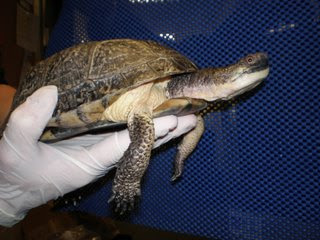We are very worried about one of our
Kemp's ridley turtles, Orion. Orion was admitted to the hospital on December 5 after being found stranded on a Cape Cod beach. He was affected by hypothermia, or cold-stunning. His condition improved over the first few weeks at the New England Aquarium, but we have recently found that he has
pneumonia. Pneumonia, or infection of the lungs, is common in stranded sea turtles because they have a weakened immune system, and they sometimes inhale sea water as they are washed up on the beach. We are treating Orion aggressively with intravenous and intramuscular antibiotics, oral antifungal medication, and with nebulized antibiotics and antifungal medication.
 |
| Orion |
This photo (courtesy of Rehab team member Adam Kennedy) shows the nebulizer treatment. The box is covered when the treatment is performed to keep the medicated mist within the box. The medicated mist will hopefully get into Orion's lungs when he breathes.
This photo photo shows a microscopic image of fluid we recently collected from his lungs. The large purple cells on the right side of the picture are epithelial cells from the lung. The small purplish dots all over the picture are bacteria. The bluish, segmented, straight structures in the middle of the image are called fungal hyphae, which are fungus cells.
Such pneumonia cases can be fatal for sea turtles. We had one piece of good news yesterday when Orion ate a crab! I will keep you informed of his condition. We are awaiting some lab tests to identify the types of bacteria and fungus that are present, and to determine which drugs will best kill the bacteria and fungus.
- Dr. Innis





